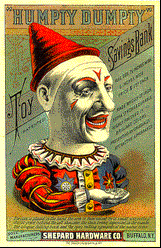 MECHANICAL
BANK TRADE CARDS MECHANICAL
BANK TRADE CARDS
Mechanical
banks began appearing shortly after the end of the American
Civil War. These toy savings bank were made primarily of
cast iron, with one or more moving parts. Distribution of
mechanical banks hit its stride during the 1880s, continued
strong throughout the 1890s, then fell off sharply after the
turn of the century - thus paralleling the distribution of
trade cards.
Trade cards that advertise
mechanical banks are the most coveted (and expensive) of all
trade cards. Several factors converge to make this
so.
First off, there is the
enormous collecting interest in the banks themselves. With
many banks bringing solid five-figure prices, it's not
surprising to see a coattail effect on bank trade
cards.
Another thing that
mechanical bank cards have going for them is that most of
them are absolutely terrific trade cards from any objective
graphics standpoint. The care lavished on their design may
have been tied to the relatively high cost of mechanical
banks. The fact that banks retailed for between $ .50 and
$1.00 made them pretty expensive toys for their day, and
manufacturers and distributors may have felt it worthwhile
issuing particularly colorful, well-printed trade cards to
advertise them.
Finally, mechanical bank
trade cards are truly rare. Since mechanical banks were sold
in limited quantities, only minimal numbers of trade cards
to promote them were warranted. This means that today, there
are very few of these highly-sought, top-quality trade cards
available.
Full-color trade cards are
known for sixteen mechanical banks:
There is also a full-color
trade card for the Safe
Deposit still
bank (still banks, unlike mechanical banks, do not have
moving parts).
To view any of these cards,
click on its link shown above. Or, if you prefer, these
cards can be viewed sequentially as a Slideshow.
|